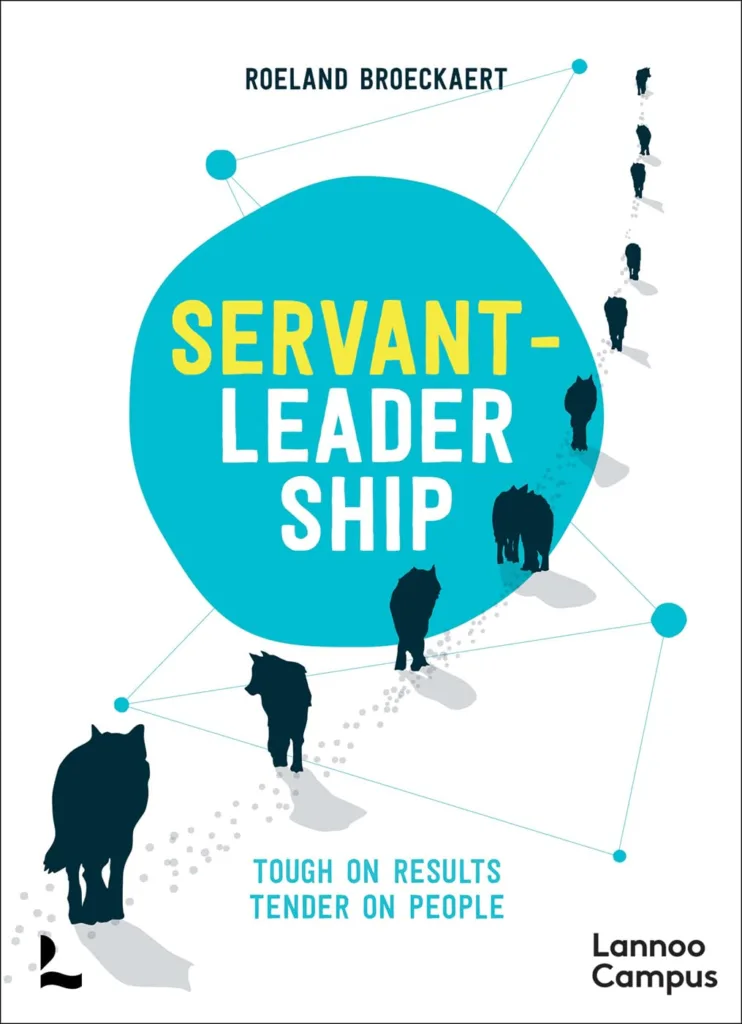Since August 7, 2024, there is an English version.

Contents
The principle is simple, isn’t it?
“In principle, it’s simple, isn’t it? You just have to make sure you have happy employees.” It is true that employees are important as social capital. But is it simple? After all, there are areas of tension, e.g. between delegation and trust, between available time and priority, between quality quantity and budget. Drive is key for your employees. To do this, they must recognize and take initiative themselves, develop talents, work together, be efficient, believe in what they do.
You’re like a daddy
As a manager, you are like a dad with children: you help them practice until they can do it themselves. So that they can help their children later on. Leadership is not about followers, but about forming leaders. In addition to the organization’s raison d’être, the employee is an end in itself. Furthermore, servant leadership is a natural phenomenon. For example, a pack of wolves would be less hierarchical than previously thought. Each takes charge of the things he/she knows best from time to time. The leader does not lead to be the boss. He/she is not a control freak and delegates as much as possible. There is participation, the structure is not rigid, no threats or show of force. There’s a lot of empathy. It is an example from nature that continuously shapes itself according to the most efficient working method, working together here. From this, a servant leader can learn how to lead a “pack of men.” You earn a mandate by finding a balance between serving and directing. With this, you have to meet a number of the needs of your employees. They are: (ABC)
- Autonomy: the employee wants to decide for himself what he does and how.
- Bonding with a goal and the team: the desire to do something meaningful together, something that makes ‘a difference’. Together with the team and the organization.
- Competence: the employee wants to be good at something and get recognition for it.
In the case of non-hierarchical natural peoples
In the case of non-hierarchical natural peoples, a leader usually cannot control the group hierarchically. The position of the leader is then determined by the value that the group members assign to him. In such a flat hierarchy and without power differences, such as in a self-managing network organization, servant leadership is almost self-evident. Studies show that servant leadership is the most effective in the long run. But it also requires the most of trust. There is less rivalry and less absenteeism among employees. This also means less stress for the leader. So also more time for better contact with the work floor. So a better support base. And more attention to the customer. And that’s exactly where the employees come closest. So they should do their work with full enthusiasm, and with drive, because they are the ambassadors of the organization. So they need to be well led by a good leader. Authoritarian leadership, it is well known, has a counterproductive effect. The employees will then work more/too much for maximum personal reward. A form of one-sided profit maximization. And therefore less attention to empathy with colleagues and the customer. The effect of servant leadership can therefore hardly be overestimated. It works from a system of personal profit motives to the employee’s drive.
Working with ABC: how do you do it?
To this end, ABC needs to be worked on. But how do you do that? To this end, as a manager, you can take a different position each time:
- Autonomy – The manager: by giving space to the employees and taking control of the activities
- Bonding – The leader: by setting the direction of the organization and strengthening the relationships between all stakeholders
- Competence – The coach: by determining the roles based on talents rather than stimulating competencies and reflection in a safe learning environment.
In the chapters that follow, the author elaborates on these matters step by step. Among other things, it is about the yardstick you set for your employees, the vision you create for the organization, and for the attitudes towards the ABC needs of the employees. To this end, the author offers a range of possibilities.
Title: Servant-Leadership: Tough on Results, Tender on People, Author: Roeland Broeckaert, Publisher: Lannoo Campus, ISBN: 978-9401407267

Hi Manu!
Thanks for the lovely review!
The book is recently translated in English:
https://www.amazon.com/Servant-Leadership-Tough-Results-Tender-People/dp/9401407266/ref=mp_s_a_1_1?crid=29YO6H0002DBC&dib=eyJ2IjoiMSJ9.y1EQo89vk02KWwDdSZivr42-Pdm_RYNavdZeB5FOCYDLCEWbAt8r7US0Ya1cEOoILcrXMbs_trPKFoq_qS8Wmw.t2tRQOVojiGpLWGwQxLra0WsaYHZHKCgMX9oiAZT2yo&dib_tag=se&keywords=servant+leadership+roeland&qid=1733176178&sprefix=servant+leadership+roeland%2Caps%2C252&sr=8-1
Maybe this interests you!
Kind regard,
Roeland